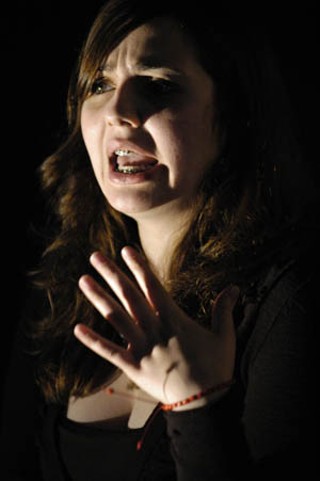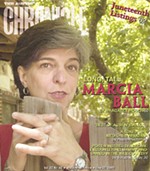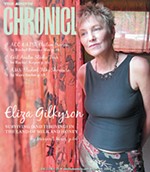Warrior Voices
With a Spanish-language production of 'The Vagina Monologues,' Austin Latinas are making themselves heard
By Belinda Acosta, Fri., Feb. 16, 2007

(The identities and personal details of some interviewees have been altered at their request.)
When "Ana" was raped at 13, it was an experience beyond words. Although she received preliminary counseling, her well-meaning parents withdrew her from treatment when she got a boyfriend. They thought she was fine. The event was behind her. It was time to move on. Twenty years after the assault, Ana saw a 2003 production of The Vagina Monologues performed at the University of Texas. It was then she realized that not only were there words to describe her experience but that the experience was not behind her. It was something she carried into the present – a wound that hadn't healed. And others shared the experience. But even more startling were the poderosas she saw on stage: powerful women who broke past silence and cultivated shame to speak honestly, poignantly about their bodies and the stories they carried.
"When I saw that UT production, I thought, 'Oh, I really do have power. I do have value. I do have a voice.'"
This weekend, Ana joins the voices of 15 other women when she participates in a local production of Eve Ensler's The Vagina Monologues, one of thousands of productions across the nation and around the world that is now an annual event produced in collaboration with the V-Day organization (see "Eve Ensler and the V-Day Story," p.42). While this is not the first time the show has played in Austin, it is the first all-Spanish-language version produced in Austin, and perhaps all of Texas, as Los Monólogos de la Vagina.
Now translated into 45 languages, the script being used by the Austin cast is the same one used in a Mexico City production, tailored for localisms. An interesting task, considering the range of places the cast members are from and the linguistic distinctions they bring with them: Washington, D.C.; Venezuela; Mexico; Puerto Rico; El Salvador; as well as Austin, San Antonio, and El Paso. But translation issues are one thing. The larger cultural and social challenges to presenting Los Monólogos de la Vagina are another. The influence of the traditional Roman Catholic Church, with its conservative views on sexual expression, is still strong in Latin America, as are some lingering ideas about women's subordinate role to men. Last year in the United States, the president of Notre Dame University, the Rev. John I. Jenkins, found himself at the center of a turbulent debate about the appropriateness of allowing a performance of The Vagina Monologues at a Roman Catholic university. The production was allowed, but the incident struck at the core of the church's struggle to hold its centrality in a world that has evolved beyond the Second Vatican Council (1962-1965).
The degree to which these macro influences resonate with Los Monólogos' cast members is as varied as the women themselves. As human-service workers, professors, students, counselors, bilingual-education teachers, and mothers, sisters, and daughters, the overall interest in presenting this play is not about taming institutional dragons or challenging customs but about taking that small but enormously liberating step from silence to bearing witness. Each cast member has her own compelling reason for participating in Los Monólogos de la Vagina.
"I really thought it was important to present this to the immigrant community," says Cynthia Trejo, the lead producer of Los Monólogos de la Vagina. She performed in an English-language production at the play! Theatre in East Austin in 2005 and 2006, directing a monologue presented in Spanish last year. The experience drove her and co-producers Veronica Hernandez and Marialy Gonzalez to attend an annual Vagina Warrior Workshop (formerly the Regional Empowerment Workshop) in New Orleans last November to get a better grasp of what was expected of producers and how V-Day works.
"We were all shocked when Eve Ensler walked into the room," Trejo says. She was further impressed that Ensler wasn't there merely to make an appearance but facilitated. She talked to the participants as peers and answered questions, but, most importantly, she actively listened to what all participants brought to the table.
"It was very inspirational, almost a spiritual experience," Trejo says. "In the end, it's not about Eve Ensler or any one 'star'; it's about the larger movement to end violence against women. It doesn't have to do with me; it has to do with all of us."
After the workshop, Trejo was determined to mount a Spanish-language production in Austin.
So Many Silences to Be Broken
"I love the play and what V-Day represents," says Kiara Alvarez, a native of Puerto Rico who's been living in Austin for four years. As a writer and educator who works at the Center for Child Protection, her reasons for joining the Monólogos cast addresses personal and professional goals.
"Audre Lorde said in an essay that 'it is not difference which immobilizes us, but silence. And there are so many silences to be broken.' That, for me, is at the core of my work, both in human services and in writing. Perpetrators of sexual, physical, and emotional violence use silence and fear as tools to terrorize a victim. Sexually abused children are threatened with what will happen if they tell, women in situations of domestic violence are isolated from their families and friends, and many of us hold on to the belief that if we just stop thinking about or speaking about traumas we've experience, then they will go away."
Anecdotal evidence suggests that undocumented immigrants are even less likely to seek help following an assault or abuse for fear that their undocumented status will override their need for help. That fear is not unfounded. In an already hostile, anti-immigrant climate, Texas state Rep. Debbie Riddle, R-Tomball, recently introduced legislation to prohibit "safe haven" cities such as Austin and organizations that provide sanctuary services to the undocumented. If House Bill 1012 passes, critics say law-enforcement officials could find themselves inspecting immigration status when time could be better spent investigating and solving crimes – if the crime is even reported in the first place. Like other domestic-violence victims, new immigrants may be reluctant to report abuse, feeling that it is a private family matter. Regardless of immigration status, having barriers for seeking and receiving help is another form of victimization, equal to or worse than the original crime.
Speaking to the Hispanic Population
While V-Day's core mission is to end violence against women, Los Monólogos de la Vagina is far from "victim rights" theatre.
"It's about thriving and about claiming your right to be a happy, loving, loved woman in a peaceful society," Alvarez says.
The script is full of proud realizations that come with speaking freely and shedding (or poking fun at) infantilizing or shame-inducing language about sex and the female body. Being able to do so in one's native language is an added incentive.
"The Spanish-language aspect of the production caused me to be especially excited about being a cast member," says Maria Rivera, a full-time lecturer in the Department of Advertising at UT-Austin. "It allows me to tap into a part of my Hispanic identity that I don't normally get to revisit on a daily basis in Austin."
"When Maria sent me the e-mail, I was like, 'Cool. Okay, it can be the first time I can talk about the vagina in front of people,'" Carmen Elena Murcia jokes. She recently moved from El Salvador to work for an advertising agency in Austin. "No, really. I'm proud to be in this, speaking to our people."
That doesn't mean the script doesn't cause moments of uneasiness. For all its inviting play, its candor can be an epiphany to one ear, shocking to another.
"I feel that the Hispanic population – we still need that extra push to become comfortable with women's sexuality," says Andrea Troncoso, a 23-year-old student. "I can still hear the discomfort in my parents' voice when discussing the show. Don't get me wrong. They're incredibly supportive. It's just the word 'vagina' that gets to them."
Some cast members haven't told their families they are in the show and haven't decided if they will. The degree of disclosure depends on a variety of intersecting factors: generation level in the U.S., education, and age, in addition to the nature of familial relationships.
Finding the Voice

V-Day encourages a grassroots approach to producing all performances of The Vagina Monologues, no matter what language it's performed in. The emphasis is not about providing a vehicle for a few stars or creating a slickly produced event. The rehearsal process is more collaborative than in a conventional theatre setting where the director gives notes to actors after rehearsing a scene. In this way, the process is just as important as the product.
"I like finding the rush of who you are, finding the voice, finding the weight in the voice," Rivera says when speaking of her rehearsal experience. The last time she performed in a live theatre event was in high school. "I think that's the coolest thing. You have this thing in your gut that tells you you can do it, even when you're scared," she said. "But don't think it's not uncomfortable to have an orgasm in front of 300 people. It's challenging, but a great challenge. It feels empowering."
Rivera was speaking of the first rehearsal of the monologue describing various orgasmic expressions. The atmosphere was playful, tinged with a bit of bashfulness. Laughter and encouraging words were exchanged when fellow actors were able to push past their nervousness and go for broke. When it was Ana's turn, she started strong, then stopped. It was assumed she was nervous, perhaps inexperienced.
"It helps if you close your eyes," one cast member offered. Her own faulty start had culminated in a shrieking rendition of the "mariachi orgasm."
"Maybe next time," another suggested.
"You'll get it."
In reality, Ana was revisiting old wounds that most of her cast members didn't have. She tried two, three more times before stopping and saying, "I can't." There was no nervous tension or exasperated impatience, only warm support.
Later, when asked about that rehearsal, Ana admitted, "It was too close. I talked to Cynthia, and we agreed that I won't do that part any more."
"I don't know, it just works out somehow," Trejo said, reflecting on her past Vagina Monologues experience and anticipating the outcome of the production she is shepherding. People drop out, and new people step in. The most confident lose their spirit, and the least confident are suddenly strong. "Every year I've participated, I don't know how it happens, but I know to have faith that it will."
Helping Others by Speaking
"Compassion," Ensler wrote in her 2006 essay "Celebrating Vagina Warriors," "is the deepest form of memory. ... Vagina Warriors know that the process of healing from violence is long and happens in stages. They give what they need most, and by giving this, they heal and activate the wounded part inside."
For Ana, first seeing, and now participating in, Los Monólogos de la Vagina is that activation process. "I want to be another one of the women who helps other women realize the power they have, just like I was helped when I first saw [The Vagina Monologues]. Being part of this [performance] has helped me the most."
Without expecting it, Ana received the healing balm she needed from a community of women working toward a shared goal. And though she's encountered her own challenges preparing for Los Monólogos de la Vagina, she's compelled to continue, certain that "our voices in this play are for the voices of the women lost and the ones still needing to be heard."
If that is not faith healing, then nothing is. ![]()
Los Monólogos de la Vagina will be performed Thursday and Friday, Feb. 15-16, 7:30pm, at El Buen Samaritano, 7000 Woodhue. Proceeds benefit Arte Sana (www.arte-sana.com) and SafePlace (www.austin-safeplace.org).









